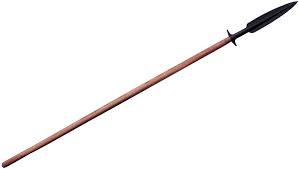中文词源
spear 矛,标枪
来自古英语 spere,矛,标枪,来自 Proto-Germanic*speri,矛,杆,来自 PIE*sper,矛,杆,来 自 PIE*spei,尖刺,词源同 spar,spike,spire.
英语词源
- spear
-
spear: [OE] Spear is a general Germanic word, with relatives in German and Dutch speer (the Scandinavian forms have died out). Its ultimate ancestry is uncertain, although it may have distant links with English spar and Latin sparus ‘hunting spear’.
- spear (n.1)
- "weapon with a penetrating head and a long wooden shaft, meant to be thrust or thrown," Old English spere "spear, javelin, lance," from Proto-Germanic *speri (cognates: Old Norse spjör, Old Saxon, Old Frisian sper, Dutch speer, Old High German sper, German Speer "spear"), from PIE root *sper- (1) "spear, pole" (cognates: Old Norse sparri "spar, rafter," and perhaps also Latin sparus "hunting spear").
- spear (n.2)
- "sprout of a plant," 1640s, earlier "church spire" (c. 1500); variant of spire (n.).
- spear (v.)
- 1755, from spear (n.1). Related: Speared; spearing.
权威例句
- 1. Mr. Dambar had started off as an assistant to Mrs. Spear's husband.
- 丹巴尔先生的第一份工作是给斯皮尔夫人的丈夫当助理。
- 2. Spear showed him around the flat.
- 斯皮尔带他参观了公寓。
- 3. I fended off his sword thrust with my spear.
- 他一刀砍来,我拿枪架住.
- 4. He thrust her with a spear.
- 他用矛刺她.
- 5. The spear pierced the lion's heart.
- 那矛刺穿了狮子的心脏.

